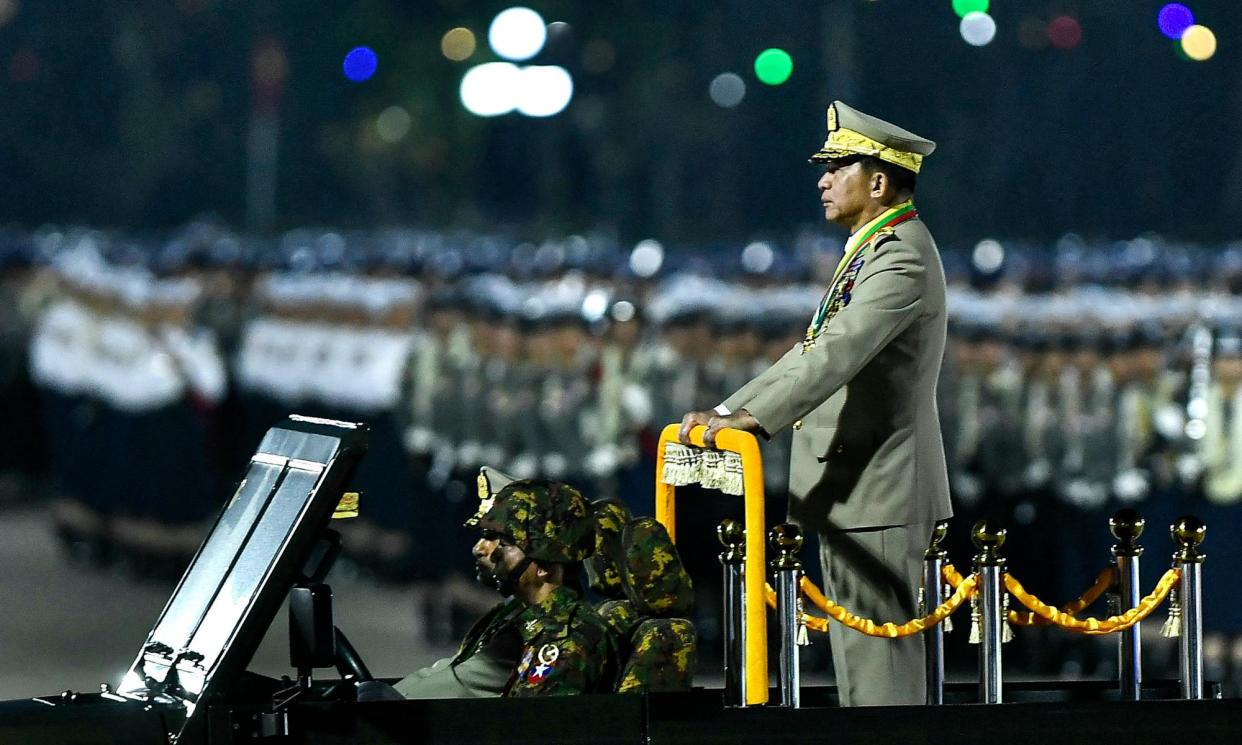Myanmar: is the junta’s grip on power weakening and what next for its leadership?

Myanmar’s military junta is on the brink of losing control of a major trading town, Myawaddy, on its eastern border with Thailand, after soldiers defending the position surrendered in recent days, according to opposition groups.
This is the latest in a series of defeats for the junta, which has also lost crucial territory along its border with China and India, as well as areas of Rakhine state, in the west of the country.
These defeats aren’t just economic or strategic blows for the junta – they’re also a humiliation for the generals. Such developments have been celebrated by the wider pro-democracy movement, and provoked anger among the military ranks, raising questions about how long the junta chief, Min Aung Hlaing, can survive.
Who is fighting against the Myanmar military and why?
The military seized power in a coup three years ago, ousting the democratically elected government of Aung San Suu Kyi and causing outrage among the public, who took to the streets to protest. The military responded with brutal crackdowns and many civilians took up arms and joined people’s defence forces to fight against junta rule – often with little weaponry or resources.
Related: Myanmar opposition carries out drone attack on capital
Some of these groups have received support from older, more experienced ethnic armed organisations that have fought with the military for decades to achieve independence for their people. These group’s specific goals, and the extent to which they are coordinated, varies.
However, the sheer number of different groups fighting the military, across various parts of the country, has left the generals severely overstretched. In a sign of how lacking in manpower the military is, it recently imposed mandatory conscription – a policy that has caused young people to flee military-controlled areas.
Is the military losing its grip on power?
The military has lost control of many important border areas and it appears unlikely it will be able to regain much territory soon. It still retains control of the centre of the country, including the big cities of Yangon, Mandalay and Naypyidaw.
“The military has been humiliated time after time after time and suffered significant losses. Clearly, there’s a very deep rot at the heart of the institution and its ability to project power,” says Richard Horsey, Myanmar adviser to Crisis Group, a non-profit that produces analysis of conflicts around the world. “It isn’t, at the moment, collapsing as an institution. This isn’t the fall of Kabul.”
However, what happens next isn’t simply a matter of how much ground the military has lost on the battlefield, says Horsey – it’s also about the psychological impact such relentless defeats are having on the institution, and the political ramifications in the capital, Naypyidaw.
There is a possibility of “regime implosion of some kind, or the implosion of [junta chief] Min Aung Hlaing’s leadership,” he says. “It just seems that it can’t go on like this forever.”
There is no clear protocol for changing leadership within the military, and any new leader may be even more brutal than Min Aung Hlaing, whose military has been repeatedly accused of indiscriminate shelling and airstrikes, torching homes and mass killings.
Any new military leader would face an uphill battle: morale is extremely low, thousands have defected and it is fighting a multitude of opponents.
How are regional countries responding?
The regional bloc, the Association of Southeast Asian Nations, has led international efforts to resolve the crisis in Myanmar, but with no success.
The Thai prime minister, Srettha Thavisin, told Reuters this week that now was a good time to open talks with Myanmar as the military regime was weakening.
Related: Blow for Myanmar’s military as rebels say hundreds have surrendered at key border town
But military generals, who are loathed by the public and accused of war crimes, appear highly unlikely to negotiate. The National Unity Government, which was set up to oppose the junta, “has made it very clear that they’re open to talks only on the condition of the military’s willing to surrender control. So it seems like a non starter,” says Hunter Marston, adjunct research fellow at La Trobe Asia in Melbourne.
China is considered the country most likely to be able to influence events in Myanmar – though there are limits to this, and relations between China and the military are complex.
China was displeased by the coup, which came at a time when it had established warm relations with Aung San Suu Kyi’s government and had investments in the country. The coup has brought chaos and instability.
China has also grown increasingly frustrated about the proliferation of online scam centres in Myanmar that target Chinese nationals, a lucrative criminal activity the military has failed to halt. Anger over this issue apparently led China to give its tacit approval to a powerful bloc of ethnic armed groups to launch a coordinated offensive against the military in northern Shan state late last year, leading to a major defeat for the military. China has since mediated ceasefire agreements in the area.
China has long been cultivating ties with all stakeholders in Myanmar, Marston says. Ultimately, it “does still see a divided and weak subservient Myanmar as ideal, even if it undermines China’s business interests in the country”.
“It doesn’t want to have sort of a western-leaning, liberal democracy on its border.”


